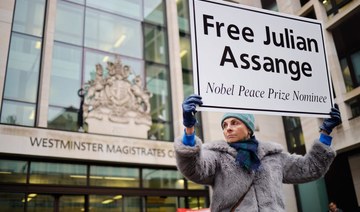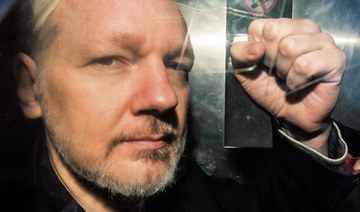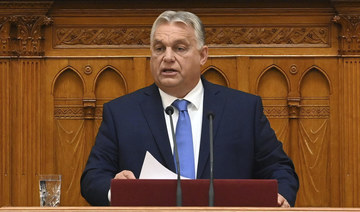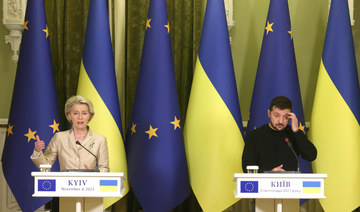LONDON: WikiLeaks founder Julian Assange is set to fight for his freedom in a British court after a decade of legal drama, as he challenges American authorities’ attempt to extradite him on spying charges over the site’s publication of secret US military documents.
Lawyers for Assange and the US government are scheduled to face off in London Monday at an extradition hearing that was delayed by the coronavirus pandemic.
American prosecutors have indicted the 49-year-old Australian on 18 espionage and computer misuse charges adding up to a maximum sentence of 175 years. His lawyers say the prosecution is a politically motivated abuse of power that will stifle press freedom and put journalists at risk.
Assange attorney Jennifer Robinson said the case “is fundamentally about basic human rights and freedom of speech.”
“Journalists and whistle-blowers who reveal illegal activity by companies or governments and war crimes – such as the publications Julian has been charged for – should be protected from prosecution,” she said.
American prosecutors say Assange is a criminal, not a free-speech hero.
They allege that Assange conspired with US army intelligence analyst Chelsea Manning to hack into a Pentagon computer and release hundreds of thousands of secret diplomatic cables and military files on the wars in Iraq and Afghanistan. They also say he conspired with members of hacking organizations and sought to recruit hackers to provide WikiLeaks with classified information.
“By disseminating the materials in an unredacted form, he likely put people — human rights activists, journalists, advocates, religious leaders, dissidents and their families — at risk of serious harm, torture or even death,” James Lewis, a British lawyer acting for the US government, told a hearing in February.
Assange argues he is a journalist entitled to First Amendment protection, and says the leaked documents exposed US military wrongdoing. Among the files released by WikiLeaks was video of a 2007 Apache helicopter attack by American forces in Baghdad that killed 11 people, including two Reuters journalists.
His lawyers argue the prosecution is an abuse of process by a Trump administration that wants to make an example of Assange. They say he would be held in inhuman conditions and would not get a fair trial in the United States.
Journalism organizations and human rights groups have called on Britain to refuse the extradition request. Amnesty International said Assange was “the target of a negative public campaign by US officials at the highest levels.”
“If Julian Assange is prosecuted it could have a chilling effect on media freedom, leading publishers and journalists to self-censor in fear of retaliation,” said Amnesty’s Europe Director, Nils Muižnieks.
The four-week extradition hearing is part of a twisting saga rife with competing claims of hacking, spying and subterfuge. Assange’s lawyers claim the US intelligence services directed a private security firm to spy on him while he was living in Ecuador’s London embassy — a case currently being heard in a Spanish court.
Assange also alleges he was offered a pardon by the Trump administration if he agreed to say Russia wasn’t involved in leaking Democratic National Committee emails that were published by WikiLeaks during the 2016 US election campaign. The White House denies that claim.
Assange’s legal troubles began in 2010, when he was arrested in London at the request of Sweden, which wanted to question him about allegations of rape and sexual assault made by two women. He refused to go to Stockholm, saying he feared extradition or illegal rendition to the United States or the US prison camp at Guantanamo Bay, Cuba.
In 2012, Assange sought refuge inside the Ecuadorian Embassy, where he was beyond the reach of UK and Swedish authorities — but also effectively a prisoner, unable to leave the tiny diplomatic mission in London’s tony Knightsbridge area.
The relationship between Assange and his hosts eventually soured, and he was evicted from the embassy in April 2019. British police immediately arrested him for jumping bail in 2012.
Sweden dropped the sex crimes investigations in November 2019 because so much time had elapsed, but Assange remains in London’s high-security Belmarsh Prison as he awaits the extradition decision. Supporters say the ordeal has harmed Assange’s physical and mental health, leaving him with depression, dental problems and a serious shoulder ailment.
Assange’s partner Stella Moris, who had two sons with him while he lived in the embassy, said he looked thinner and was in “a lot of pain” when she visited him in prison in late August for the first time since March.
The extradition hearing opened in February but was put on hold when the UK went into lockdown in March to slow the spread of the coronavirus. It is resuming with social distancing measures in court and video feeds so that journalists and observers can watch remotely.
Assange is expected to be brought by prison van from Belmarsh to the Old Bailey criminal court for the hearing, which is due to run until early October. District Judge Vanessa Baraitser is likely to take weeks or even months to consider her verdict, with the losing side likely to appeal.
WikiLeaks’ Assange to fight US extradition bid in UK court
https://arab.news/4cwfw
WikiLeaks’ Assange to fight US extradition bid in UK court
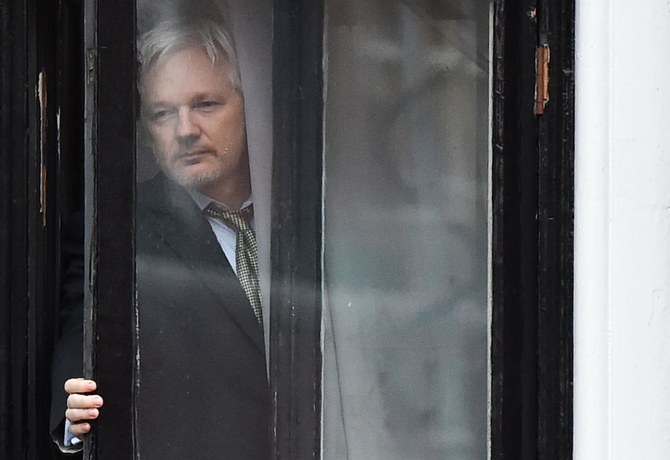
- American prosecutors have indicted the 49-year-old Australian on 18 espionage and computer misuse charges adding up to a maximum sentence of 175 years
- His lawyers say the prosecution is a politically motivated abuse of power that will stifle press freedom and put journalists at risk
NGOs seek climate trial of French oil giant TotalEnergies

- The complaint was filed at Paris judicial court days before TotalEnergies holds annual shareholders meeting
- The offenses carry prison sentences ranging between one year to five years and fines of as much as $163,000
PARIS: NGOs filed a criminal complaint against French oil giant TotalEnergies and its top shareholders in Paris on Tuesday, seeking a trial for involuntary manslaughter and other consequences of climate change “chaos.”
The case targets the company’s board, including chief executive Patrick Pouyanne, and major shareholders that backed its climate strategy, including US investment firm BlackRock and Norway’s central bank, Norges Bank.
In a statement, the three NGOs and eight individuals said they accused the group of “deliberately endangering the lives of others, involuntary manslaughter, neglecting to address a disaster, and damaging biodiversity.”
The complaint was filed at the Paris judicial court, which has environmental and health departments, three days before TotalEnergies holds its annual shareholders meeting.
The prosecutor now has three months to decide whether to open a judicial investigation, the NGOs said. If it does not go ahead, the plaintiffs can take their case directly before an investigative judge.
The offenses carry prison sentences ranging between one year to five years and fines of as much as 150,000 euros ($163,000).
“This legal action could set a precedent in the history of climate litigation as it opens the way to holding fossil fuel producers and shareholders responsible before criminal courts for the chaos caused by climate change,” the NGOs said.
The plaintiffs include “victims or survivors of climate-related disasters” in Australia, Belgium, France, Greece, Pakistan, the Philippines and Zimbabwe.
TotalEnergies did not immediately return a request for comment.
Oil and gas companies, other corporations and governments are facing a growing number of legal cases related to the climate crisis worldwide.
TotalEnergies is facing other legal cases in France related to climate change.
Outside the Paris judicial court, the NGOs held a banner reading “climate change kills” and “let’s put shareholders behind bars” — with the “share” in shareholders crossed out and replaced by the “death.”
The latest complaint aims to “recognize the deadly consequences of their decisions, their stubbornness in voting for fossil projects which threaten the stability of the climate and therefore of all living things,” Claire Nouvian, founding director of conservation group Bloom, said at a news conference.
Fossil fuels — oil, gas and coal — are the biggest contributors to heat-trapping greenhouse gas emissions.
One of the plaintiffs in the Paris case is Benjamin Van Bunderen Robberechts, a 17-year-old Belgian whose friend Rosa died in flash floods in Belgium at the age of 15 in 2021.
In Paris to file the complaint, he said he had come to “demand justice” against those “who choose profit over human lives and climate.”
In their statement, the plaintiffs said “TotalEnergies has known the direct link between its activities and climate change” since at least 1971.
“TotalEnergies followed a climate skeptic line in order to waste time, delay decision-making and protect its increasing investments in fossil fuels,” they added.
They said they hope to set a legal precedent “whereby opening new fossil fuel projects would be considered criminal.”
While the case was filed on Tuesday, TotalEnergies announced a deepwater project off the coast of Angola, with production set to start in 2028 to extract 70,000 barrels per day.
Gunmen kill around 40 people in attack in northcentral Nigeria: official

- Armed men invaded Zurak community, shooting sporadically and torching houses
- Local youth leader Shafi’i Sambo also said at least 42 people had been killed in the raid
LAGOS: Gunmen riding motorbikes killed around 40 people in a raid on a mining community in northcentral Nigeria, opening fire on residents and torching homes, the local government said on Tuesday.
The attack late on Monday on Wase district in Plateau state was the latest violence in an area which has long been a flashpoint for disputes over resources and for outbreaks of intercommunal clashes.
Armed men invaded Zurak community, shooting sporadically and torching houses, Plateau state commissioner for information Musa Ibrahim Ashoms told AFP by telephone.
“As we speak, about 40 people have been confirmed dead. Zurak is a popular mining community,” he said.
Local youth leader Shafi’i Sambo also said at least 42 people had been killed in the raid.
Wase has deposits of zinc and lead, while Plateau as a whole is known for its tin mining industry.
Sitting on the dividing line between Nigeria’s mostly Muslim north and predominantly Christian south, Plateau often sees outbreaks of violence sparked by disputes between nomadic herders and pastoral farmers.
Climate change has also helped escalate tensions over grazing land, water access and other resources such as the state’s metal reserves.
Parts of northwest and northcentral Nigeria have also been terrorized by heavily armed criminal gangs, who raid villages to loot and carry out mass kidnappings for ransom.
In January, intercommunal clashes erupted in Plateau’s Mangu town that left churches and mosques burned, more than 50 people dead and thousands displaced.
Over 3,000 Ukrainian inmates seek to join military

- Ukraine is suffering critical ammunition and manpower shortages on the battlefield
- “We predicted this before the adoption of this law,” Deputy Minister of Justice Olena Vysotska said
KYIV: Thousands of Ukrainian inmates are seeking to join the military, Kyiv said Tuesday, following a decision by lawmakers enabling some categories of prisoners to join the armed forces.
The move echoes a policy in Russia, where tens of thousands of prisoners have been sent to Ukraine with the promise of amnesty and were killed in gruelling battles that produced few gains.
Ukraine is suffering critical ammunition and manpower shortages on the battlefield that have allowed Russian forces to advance on the eastern and northern front lines.
“This is more than 3,000 people. We predicted this before the adoption of this law,” Deputy Minister of Justice Olena Vysotska said, referring to the number of prisoners who have submitted applications to join the military.
She said authorities had identified 20,000 eligible prisoners and that of them, 4,500 had “expressed interest” in joining. She added that the figure was likely to fluctuate.
Only prisoners with fewer than three years left on their sentence can apply. Mobilized prisoners are granted parole rather than a pardon.
Among those not eligible to serve include those found guilty of sexual violence, killing two or more people, serious corruption and former high-ranking officials.
Russia has recruited prisoners to serve on the front lines since the first days of its invasion, initially offering presidential pardons for six months’ service.
EU states push for June start to Ukraine membership talks

- To actually begin the negotiations the bloc’s member states still have to sign off on a formal framework for the process
- At a meeting in Brussels, France’s EU affairs minister Jean-Noel Barrot called for “the effective opening of negotiations“
BRUSSELS: Several EU countries on Tuesday called for the bloc to start membership negotiations with Ukraine and Moldova in June, but Hungary threatened to throw a spanner in the works.
The 27-nation EU took the landmark step in December of agreeing to open talks on its war-torn neighbor — and fellow ex-Soviet state Moldova — joining the club.
But to actually begin the negotiations the bloc’s member states still have to sign off on a formal framework for the process, proposed in March by Brussels.
At a meeting in Brussels, France’s EU affairs minister Jean-Noel Barrot called for “the effective opening of negotiations” before Belgium’s rotating presidency concludes at the end of June.
That statement was echoed by other ministers — including from Ireland and Sweden.
The push to move Ukraine onto the next step in its quest for EU membership comes amid fears that Hungary, the friendliest country with Moscow in the bloc, could stall progress when it takes over the presidency after Belgium.
Budapest has been hostile to Kyiv’s bid to join, arguing that Ukraine is getting pushed ahead in the queue without meeting the required criteria.
“There can be no exception on the basis of political or ideological considerations,” Hungarian minister Zoltan Kovacs said.
“There is very little, if any, progress. Again, I can repeat to you that membership, approval should be a merit based process. No exceptions.”
Another possible hurdle could come from a new right-wing government being formed in The Netherlands opposed to any new enlargement of the bloc.
Ukraine applied to join the EU shortly after Russia launched all-out invasion in February 2022.
Starting the negotiations would put Ukraine still only at the start of what is likely to be a years-long process of reforms before it can finally become a member.
Philippine island boasts world’s largest concentration of unique mammals

- 93% of mammals in Luzon are found nowhere else
- Island has higher biological diversity than Galapagos
MANILA: Luzon may be known as the largest and most populous island of the Philippines, but it is also home to the greatest concentration of unique mammal species on Earth. Most of them are found nowhere else in the world.
The island, where the Philippine capital Manila is located, had never been connected to any continental land. Throughout the ages, this allowed the species that arrived there from the Asian mainland to evolve, diversify, and thrive in different habitats of its mountain ranges and peaks isolated by lowlands.
It is also one of the oldest islands, with geological research indicating that parts of it have been dry land areas continuously for some 27 million years.
“It’s a really old island. So, there’s time for rare events to take place. That’s a big part of it,” Dr. Lawrence Heaney, biologist and curator of mammals at the Field Museum in Chicago, told Arab News.
“There are no countries in continental Europe that have (this number of) unique species of mammals.”
Heaney is one of the first researchers to document the island’s diversity and has been leading American and Filipino scientists studying mammals in the Philippines since 1981.
His team’s 15-year study, which started in 2000, concluded that there were 56 species of mammals — not including bats — on the island, and 52 of them were endemic.
This means that 93 percent of Luzon’s non-flying mammals are found nowhere else, making it a biological treasure trove.
Luzon beats even the Galapagos islands, where each has been known for its diverse and unique array of wildlife.
“Luzon takes it another step further because there are isolated mountain ranges and isolated mountain peaks that are separated from all others by lowlands. They function as islands. Islands in the sky. Each one of those islands in the sky has its own unique set of species. Luzon island is made up of islands within the island,” Heaney said.
“What’s in the northern Sierra Madre, you know Cagayan province ... is very different from what’s in the mountains that are in Aurora province, because there’s an area of lowlands that separates those two different mountain chains. Then the mountains, the next set of mountains down also are separated by another low-lying area ... There are species of mammals that occur there that don’t live anywhere else in the world.”
Many of those mammals are tiny — the size of the house mouse. When most people think about mammal species, they usually imagine those on the larger part of the spectrum, like themselves.
“We think about water buffalo and horses and lions and tigers and bears,” Heaney said. “There are actually very few large mammals, overwhelmingly, most mammals are small, less than 200 grams ... Not surprisingly, given that, most of the things that we have discovered that were previously unknown are small.”
Mariano Roy Duya, associate professor at the University of the Philippines’ Institute of Biology, who has been working with Heaney, told Arab News that 28 out of the 56 mammal species identified in Luzon were rodents.
Two of them — the Banahaw shrew rat and the Banahaw tree mouse — were endemic to Mt. Banahaw, which is only 100 km from Manila.
The Banahaw shrew-rat has a long, slender snout, a short tail, and weighs 150 grams, while the Banahaw tree mouse is the smallest member of the cloud rat family at 15.5 grams, and navigates tree branches and vines.
Their habitat is now protected due to the efforts of the Biodiversity Conservation Society of the Philippines, a group that was created thanks to the work of scientists like Heaney and Duya, who now serves as its vice president.
The society is an organization that the Philippine Department of Environment and Natural Resources consults on the country’s conservation efforts.
Some 20 percent of the species Heaney, Duya, and other researchers studied during their long Luzon project are vulnerable, endangered, or critically endangered due to habitat loss, hunting, and illegal wildlife trade.
“(These include) deer, warty pigs, cloud rats, flying foxes, cave-dwelling bats, and civets,” Duya said.
“According to the hunters we meet in the forest, these animals are becoming hard to find.”
Most of the threats to Luzon’s wildlife were observed in lowland forests, which are usually lost to human development, overlogging, conversion to agricultural fields, and trafficking.
“Close monitoring of illegal wildlife trade and regular enforcement activities should be a priority,” Duya said.
“Securing these forests, as well as forest fragments, will provide refuge to many of these endemic faunae.”



